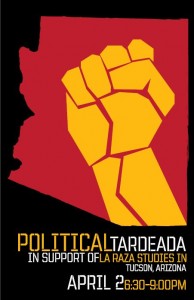June 25, 2012
By Marie “Keta” Miranda
These remarks were delivered at the 2012 NACCS Conference Panel titled “Callin’ It Like It Is: Transforming Gendered, Sexual and Heteropatriarchal Violence in Chicana/o Studies and Academic Institutions”
Fear cannot simply be created from thin air.
There have been quite a few feature stories lately about the culture of fear, especially as journalists have reflected on U.S. culture since 9/11.[i] However, I want to introduce the idea of a politics of fear into our discussion of Institutional Violence. As Antonia has stated, Institutional violence consists of the practices that violate personhood.
Anna NietoGomez helped to clarify that Institutional Violence is:
… when authorities of institutions, and organizations both formal and informal know or should have known that members or participants are bullied, harassed, and or are subject to physical and sexual violence, but do not believe they should be held accountable to institute deterrents and consequences to prevent, investigate and rectify the problem to protect the interests of the institution or organization and instead ignore, deny, shun, blame and or intimidate those who report incidents and protect the victimizer and thereby directly or indirectly encourage the repetition of hostile and violent behavior, sanction and perpetuate a hostile and unsafe environment.
Therefore, I think that as we address practices, we also need to address the politics and other activities associated with Institutional Violence.
Fear is usually expressed in a personalized and privatized way. For example, fear resonates as “what happened to a friend or a neighbor might also happen to me.” Fear as a problem is understood in an abstract sense and is generally diffused. For example, ‘I am frightened’ is rarely focused on something specific but it does express a sense of powerlessness. Institutional Violence, I believe, is about fear that is diffused and that enables a sense of powerlessness, a diminished sense of agency that leads people to turn themselves into passive subjects. Institutional violence is about pressure groups that make us scared about the people we love and about the experiences that we cherish.
When an organization is not motivated by inclusion, the more likely it is to rely on fear — particularly the fear of being an outcast from the group’s circle or society —as a means of control over its members. In many ways this shifts the arrangements, the affection and affiliation within the group, as more individuals are prepared to sacrifice their individuality in exchange for the comfortable sense of belonging to a more powerful group. Creativity is stifled and the evolution of plans, aims and missions are frustrated. Thus the monolithic group asserts itself, “to protect the interests of the institution or organization and instead ignores, denies, shuns, blames and or intimidates those who report incidents,” and a minority of individuals—courageous enough to rebel against group constraints and diktats—are cast out. And FEAR operates. Fear as a basic survival mechanism, becomes a controlling factor in people’s lives and a controlling mechanism of the present and of the future. Discussing the use of fear in politics, Niccolo Machiavelli’s 1513 handbook, Il Principe, notes: Create a fear scenario. The aim of fear is power.
Cheri Moraga, in her “Introduction” to This Bridge Called My Back speaks about knowledge, offering a shift from a binary opposition of mind/body.
Theory of the flesh means one where the physical realities of our lives—our skin color, the land or concrete we grew up on, our sexual longings—all fuse to create a politic born out of necessity.” (23)
Moraga’s intervention sets up the bodily experiences–the personal, flesh, the private, the intimate–how these experiences inform new knowledge. While a theory of the flesh is about knowledge creation, it is also a tool of political resistance. Moraga’s theory of the flesh is tied to the experience of being excluded, and provides a call for new sites of solidarity, particularly as theories of the flesh. Fear attacks the body, where the body freezes in a paralysis. Where escape or avoidance are the behavioral acts—looking for safety.
When we look at Institutional Violence, and the politics of fear, then a Theory of the Flesh can be an action—the other response to fear—not of flight but to confront, to encourage, to act.
I think that Moraga provides a way to using the body as a way to get outside traps –regulation, law, policy, procedure—ways of doing things—that trap us, immobilize us—to finding ways of addressing how we can address Institutional Violence—so that [paraphrasing Anna’s definition] we can be accountable to institute deterrents, to find ways of prevention and remedies to enhance our organizations and institutions.
[i] Culture of Fear: Risk Taking and the Morality of Low Expectation by Frank Furedi
Professor Marie “Keta” Miranda is on the faculty at the University of Texas, San Antonio.
Comment:
Theresa (Mujeres Talk Co-Moderator) July 3, 2012 at 1:12 PM
Keta,
Your essay prompts me to consider how we might enact this attention to caring for our bodies in our gatherings. Thank you for taking up how fear works on the body.


